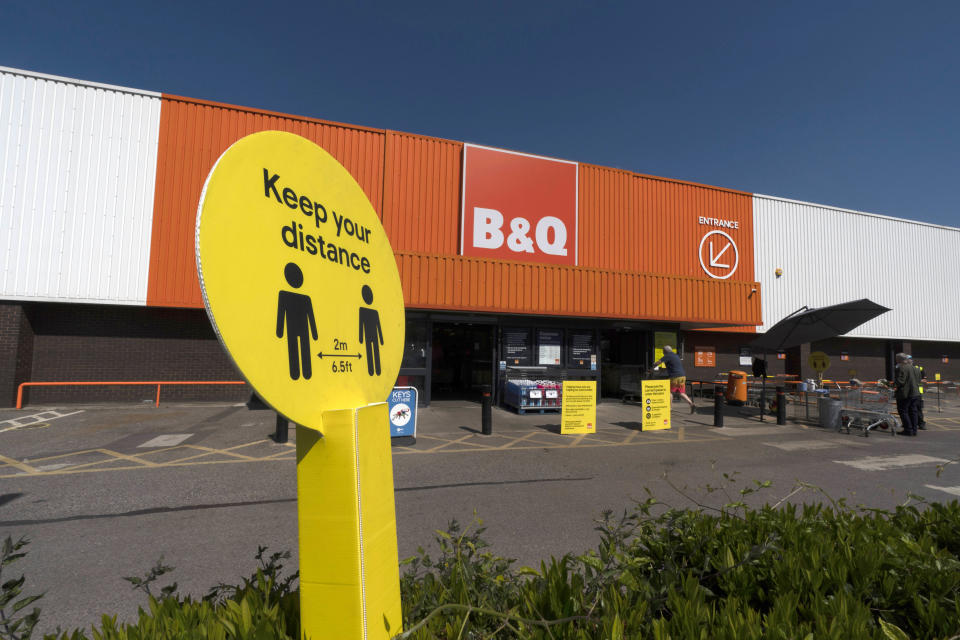What to watch: B&Q sales soar, RBS changes name, and silver soars

Here are the top business, market, and economic stories you should be watching today in the UK, Europe, and abroad:
B&Q sales soar
Shares in B&Q owner Kingfisher (KGF.L) surged to the top of the FTSE 100 after the group reported strong sales since reopening its stores.
Sales across the UK and Ireland surged 25.9% last month and jumped 33% in France, where the company trades as Castorama and Brico Depot. Sales are up almost 20% in the first three weeks of July in the UK and Ireland.
Kingfisher said profits for the first six months of the year would in fact be ahead of last year, despite the pandemic.
However, the company cautioned that “second-half visibility remains low given uncertainty around Covid-19 and the wider economic outlook.”
Shares rose 10%.
RBS to change name
Royal Bank of Scotland (RBS.L) will today officially change its name to NatWest Group, part of an effort to distance the bank from its troubled financial crisis legacy.
The bank will today make application to Companies House in Edinburgh to officially change its name. Confirmation is expected later on Wednesday.
“This is a historic day for our bank,” chief executive Alison Rose said in a statement. “Although there will be no changes to our customer brands, it’s a symbolic moment for our colleagues and stakeholders.
“The bank has changed fundamentally over the last decade and now is the right time to align our Group name with the brand under which the majority of our business is delivered.”
RBS also announced it had appointed its first ever independent climate advisor, influential economist Lord Nicholas Stern.
Stocks dip
European stocks slipped on Wednesday morning, retreating from strong gains seen in the wake of the EU stimulus deal agreed the day before.
The €750bn (£681bn, $866bn) COVID-19 recovery package agreed by EU leaders on Tuesday (21 July) had sent stocks higher — with the DAX briefly turning positive for the year — but stocks dipped ahead of the close and continued to trade lower when markets reopened on Wednesday morning.
The DAX (^GDAXI) opened down 0.1% in Frankfurt, the CAC 40 (^FCHI) slipped 0.4% in Paris, the FTSE MIB (FTSEMIB.MI) was flat in Milan, and the IBEX 35 (^IBEX) dropped 0.3% in Madrid.
In London, the FTSE 100 (^FTSE) opened down 0.2%.
Sentiment wasn’t helped by a weak session in Asia overnight, driven by renewed fears about a COVID-19 flare-up in the region.
Tokyo continues to report rising cases, with over 1,600 in the past week, and the Australian state of Victoria recorded 484 new cases in the last 24 hours, a new national record. Hong Kong announced 61 cases and 14 new deaths in the last 24 hours.
Japan’s Nikkei (^N225) dropped 0.5%, the Hong Kong Hang Seng (^HSI) slipped 0.3%, and Australia’s ASX 200 (^AXJO) fell 1.3%.
In China, the Shanghai Composite (000001.SS) rose 0.3% and the Shenzen Component (399001.SZ) gained 0.9%.
Wall Street looked set to open marginally higher as lawmakers there continue to debate an additional dose of stimulus. S&P 500 futures (ES=F) were up 0.1%, Dow Jones futures (YM=F) were 0.3% higher, and Nasdaq futures (NQ=F) climbed 0.1%.
Gold and silver rally
Gold and silver prices rallied strongly on Wednesday.
Gold (GC=F) was up 0.4% to $1,851.00 per ounce on Wednesday morning, having touched a 9-year-high earlier in the session and remaining close to record highs.
Neil Wilson, chief market analyst at Markets.com, said the rally was a defensive play by investors looking to preserve their wealth in the face of low interest rates and a looming global recession.
“The way interest rates are looking combined with the macro backdrop and the threat of an inflation surge caused by the amount of aggressive monetary and fiscal stimulus, means gold may end the year at $2,000,” he said.
Silver (SI=F), meanwhile, also rose. The precious metal jumped 2.5% to $22.11 per ounce.
The rise in precious metal prices pushed mining companies higher. Fresnillo (FRES.L), the world’s largest producer of silver from ore, jumped 6.5% on the FTSE 100 and Polymetal International (POLY.L) rose 2.5%.
Dollar under pressure
The rally for precious metals was helped by weakness in the US dollar, which is often seen as a haven for international investors.
The dollar slipped against almost all major currencies overnight, with analysts pointing to a downbeat assessment of the COVID-19 pandemic from US president Donald Trump.
“The dollar came under pressure yesterday,” said Conor Beakey, an economist at AIB. “The greenback may have been held back by concerns over the US macro outlook. President Trump yesterday stated the Covid situation will get worse before it gets better. Meantime, the euro was also generally holding a firmer tone.”
The dollar was fighting back in early trade on Wednesday. The US currency was up 0.5% against the pound to £0.79 (USD/GBP=X) and flat against the euro at €0.86 (EUR=X)
However, the greenback remains down 2.5% against the euro over the last month and down 2% against the pound.
Melrose sales slump
Manufacturing turnaround specialist Melrose Industries (MRO.L) slumped to the bottom of the FTSE 100 after warning on weak income and saying it will not pay a dividend.
Melrose said in a trading statement that revenue fell 27% in the first half of the year after the pandemic forced the closure of many of its factories.
“This has been an extraordinary period which has needed our management teams and employees to carry out difficult actions with speed and determination,” chief executive Simon Peckham said.
“For this year the focus is on cost control and cash generation, but we have protected investment in innovation for the future. Whilst timetables will have been affected, we remain confident that our businesses will adapt and produce good returns for our shareholders.”
Shares dropped 14%.
Listen to the latest podcast from Yahoo Finance UK

 Yahoo Finance
Yahoo Finance 